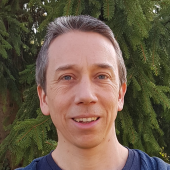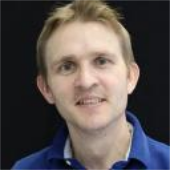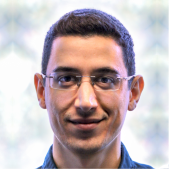
|
Summer school on the topic of deformation in robotics
4-8 Jul 2022 Villeneuve d'Ascq (Lille) (France)
|
|
|
|
Lectures and Keynotes > Day 5 -Applications of Deformation in RoboticsApplications of Deformation in Robotics
9:30-11:00: Keynote "Deformations at Different Scales: From Nano to XXL Robotics" - Guillaume Laurent and Stéphane CaroAbstract: Microrobotics aims to develop small size robots and precision robots able to handle micro and nano objects. Continuum robotics open new ways to design such robots and raise new challenges. This presentation will tackle two questions: 1) what are the interest to make continuum robots at small scale? 2) due their deformable nature, are continuum robots able to reach sufficient precision for handling micro-objects ? At the other end of the scale, XXL robotics aims at developing new outstanding robotic platforms as well as a national coordination of their open-access (physical access, numerical access, open-data and open software). This presentation will focus on strategies for improving the accuracy of cable-driven parallel robots and some research works towards collaborative cable-driven parallel robots.  Bio: Guillaume J. Laurent received his Ph.D. in control systems and computer sciences from the University of Franche-Comté in France, in 2002. He is currently associate professor at the National School of Mechanics and Microtechnologies (ENSMM) in Besançon. He is member of the Automatic Control and Micro-Mechatronic Systems Department of FEMTO-ST Institute, CNRS. His research interests include microrobotics, computer vision, parallel and continuum robots. 
Bio: Stéphane Caro works as Director of Research at the National Centre for Scientific Research (CNRS) and in the Laboratory of Digital Sciences of Nantes (LS2N), UMR CNRS 6004, France. Dr. Caro received his Engineering and M.Sc. degrees in mechanical engineering from Ecole Centrale Nantes in 2001, and his Doctorate degree in mechanical engineering from the University of Nantes in 2004. He was a Post-doctoral Fellow in the Centre for Intelligent Machines, McGill University, Montreal, QC, Canada from 2005 to 2006. He was awarded the accreditation to supervise research (HDR) in 2014. Dr. Caro is the head of the “Robots and Machines for Manufacturing Society and Services” (RoMaS) Team at LS2N. He is also a part-time researcher at IRT Jules Verne, a mutualized industrial research institute. Moreover, he is a lecturer at Ecole Centrale de Nantes. He is a member of ASME and IEEE. He received the 2018 Reviewers of the Year award for the ASME Journal of Mechanisms and Robotics, and the 2019 Crossley Award, Mechanism and Machine Theory. He is associate editor for the ASME Journal of Mechanisms and Robotics. Dr. Caro’s research focuses on design, modeling and control of cable-driven parallel robots and reconfigurable parallel robots.
11:30-12:30: Keynote "Medical Applications: The Important Role of Continuum Robotics" - M. Taha ChikhaouiAbstract: Medical applications benefit from standard rigid-link robotics since the early 90's. Such robots offer repeatability, accuracy, and opened the scope for new clinical practices and operations. Rigid-link robots started with adaptation and integration of industrial counterparts - matured by several decades of developments - before a larger spread via dedicated systems. Continuum robots under development for medical applications are younger and specifically developed for given procedures with ever-growing technology. They drastically reduce the invasiveness, allow for novel diagnosis and therapy, and reach confined anatomy. This presentation focuses on major developments in the field, highlights some cutting-edge systems under research, and summarizes key challenges facing continuum robotics community.  Bio: M. T. Chikhaoui received his Ph.D. in Automatic Control from the University of Franche-Comté in 2016. His research was performed at FEMTO-ST Institute in Besançon, France, where he was affiliated with the Automatic Control and Micro-Mechatronic Systems (AS2M) Department. He is recipient of the Prix de Thèse 2016. He was a postdoctoral researcher at the Laboratory for Continuum Robotics, Leibniz Universität Hannover in Hanover, Germany between 2017 and 2018. Since 2019, he is a research scientist at CNRS (The French National Centre for Scientific Research), appointed to TIMC Laboratory in Grenoble, France with the Computer-Assisted Medical Interventions (CAMI) team. He serves in multiple editorial boards including IEEE Robotics and Automation Letters. The main focus of his research is continuum robotics for medical applications. His interests are based on an interdisciplinary approach including robotic design, modeling, innovative mechatronics, and control strategies based on perception, among others. |

